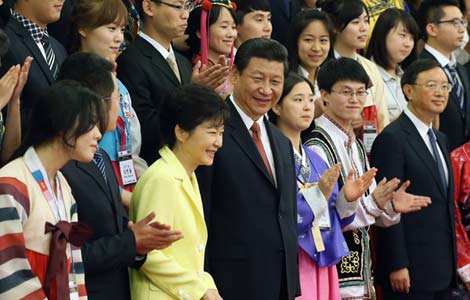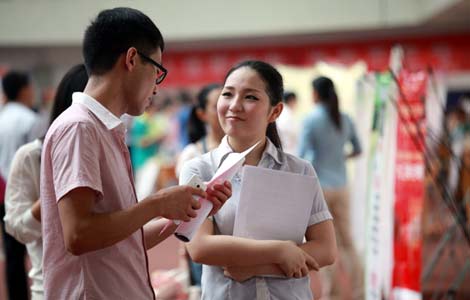Sound urbanization
Updated: 2013-06-28 08:07
(China Daily)
|
||||||||
In the context of the national economic deceleration amid dwindling export and investment demand, urbanization is viewed as a particularly important relay baton to sustain China's economic momentum by boosting domestic demand.
However, there have been huge controversies over what kind of urbanization China should have and how. In some regions, urbanization has been used as an excuse for "construction expansion", creating heaps of good-looking gross domestic product figures while bringing no substantial improvements in people's lives.
A recent urbanization roadmap drafted by the National Development and Reform Commission gets to the crux of the problem. According to a report submitted by China's top economic planner to the national legislature on Wednesday, policy restrictions on people gaining a household registration, or hukou, in towns and small cities will be removed and such restrictions on newcomers to middle-sized cities will be suspended in an orderly manner.
The preconditions for gaining a hukou will be gradually relaxed in large cities, making it possible for some rural residents to gain a household registration in the metropolises.
This is the first time that China has made an official clarification of how to press ahead with its urbanization. It will remove some of the systematic barriers that prevent migrant workers from becoming urban residents so they can enjoy the same medical care, pensions, education and housing welfare as their urban counterparts.
China's new leaders have repeatedly stressed that the country should pursue a new type of urbanization that helps rural migrant workers become urban residents and focuses on the quality of life in cities, instead of just expanding the size of cities.
Without sweeping reforms of its entrenched hukou system, any urbanization effort will fall into the urban expansion model of the past.
To local governments, lifting the lid on the restrictions imposed by rural hukou means that more money must be injected into the building of an expanded public welfare network. Yet how to ensure its implementation will require well-conceived policy designs and follow-up measures from the central authorities.
(China Daily USA 06/28/2013 page15)

 NASA telescope to probe solar mystery
NASA telescope to probe solar mystery
 Visit aids 'trust-building process'
Visit aids 'trust-building process'
 King of Pop returns
King of Pop returns
 Crowds cheer Court decision on gay marriage
Crowds cheer Court decision on gay marriage
 Hiring index signals further job weakness
Hiring index signals further job weakness
 Dance becomes popular stress relief
Dance becomes popular stress relief
 Philippine, US start Naval exercise in S China Sea
Philippine, US start Naval exercise in S China Sea
 Supreme Court gay rights ruling celebrated across US
Supreme Court gay rights ruling celebrated across US
Most Viewed
Editor's Picks

|

|

|

|

|

|
Today's Top News
Senate OKs immigration reform; hurdles remain
Snowden could request asylum in Russia: official
US collects Internet data on citizens
Boston bombing suspect accused in 4 deaths
816 elected in provincial leadership reshuffle
US adds to DPRK sanctions list
Chinese pros put trust in blogs
More Americans see Snowden as patriot: Poll
US Weekly

|

|






